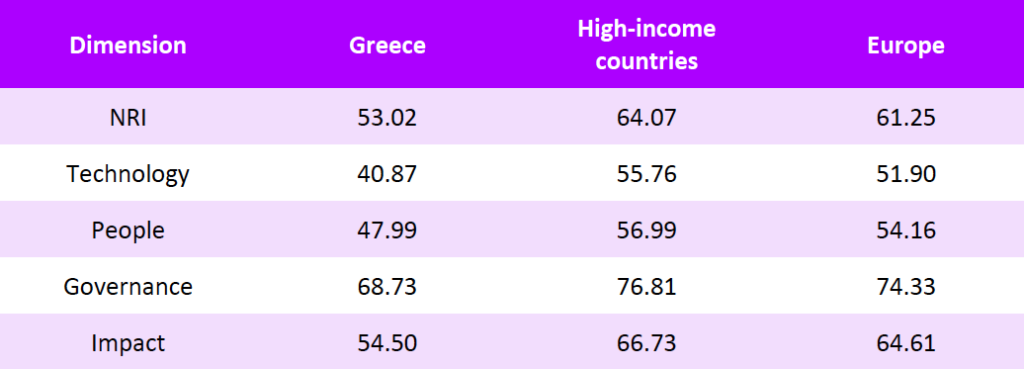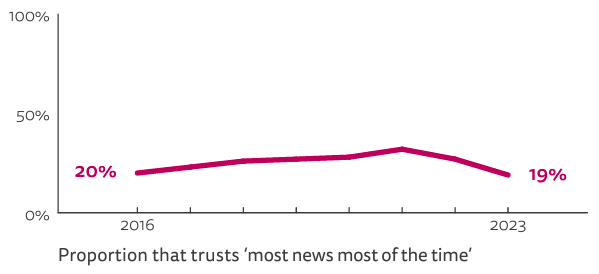This article aims to analyze developments around trust in media and digital technologies in Greece over the last year. More specifically, it focuses on trust in technology by examining the results of the 2023 Network Readiness Index and the trust in media as reported by Oxford Reuters Institute’s 2023 Digital News Report.
While European nations, particularly those in Northern and Western Europe, continue to top the global digital readiness rankings, Greece lags behind the region, ranking 49th out of the 134 economies included in the 2023 Network Readiness Index. The country scores below its European and high-income peers in all four pillars: Technology, People, Governance, and Impact (Figure 1). Notably, Greece also trails other European economies in all three sub-pillars of Governance: Regulation, Inclusion, and Trust. Greece also remains behind the region when it comes to the prevalence of ICT skills in the education system, the use of virtual social networks, and adult literacy, all of which are relevant factors to the state of trust towards digital technologies within a society.
Figure 1: Greece scores vs. averages of its income group and region, overall and by pillar

When it comes to trust in media, Greece ranks 46th of the 46 countries included in the 2023 Digital News Report, a study carried out by the Reuters Institute for the Study of Journalism that aims to understand news consumption in a range of countries in the digital age. The research finds that globally, trust in the news has fallen across markets by a further 2% in the last year. Given the accelerated structural shifts towards more digital, mobile, and platform-dominated media environments, audiences are becoming increasingly skeptical of the algorithms used to select what they see via search engines, social media, and other platforms. Finland maintains its position as the country with the highest levels of overall trust in news media (69%), while Greece (19%) has the lowest after a year characterized by heated arguments about press freedom and the independence of the media (Figure 2). Public media brands are amongst those with the highest levels of trust in many European countries, but their reach has been declining with younger audiences. Facebook remains one of the most-used social networks overall, but its influence on journalism is declining as it shifts its focus away from news and faces news challenges established networks such as YouTube and youth-focused networks such as Tik-Tok.
Figure 2: Greece Overall Trust Score 2016-2023

Over the past year, trust in the news among Greeks fell dramatically, reversing the gains made during the COVID-19 pandemic period. This year, it was reported that only 19% of respondents trust news most of the time in the country, the lowest figure in the Digital News Report’s sample. This may be partly attributed to perceptions of undue political and business influence on journalism, and a recent wiretapping scandal involving prominent politicians, businessmen, and journalists. Greece’s performance is also characterized by selective news avoidance, exacerbated by urban-rural digital divides, falling web traffic, and difficulty of engaging audiences on subjects such as humanitarian crises and climate change. According to the Digital News Report, women tend to display more news-avoidance than men. Further contributing to Greece’s low levels of media engagement and trust are its higher degrees of political polarization as well as the widespread and forthright criticism of the news media—some of the highest reported levels of media criticism are found in countries with high levels of distrust, such as Greece.
Discussions about press freedom intensified in May 2022, after the annual press freedom index by Reporters Without Borders (RSF) placed Greece in 108th position (down 38 positions from 2021), below many non-democratic countries. The report accused the government of restricting media freedom, which received push-back from the government. The decision of a special court to convict the former Minister of Digital Policy, Telecommunications and Media for illegal interference in the TV licensing auction in 2016 – along with others who participated in the process – exacerbated existing perceptions of undue political and business influence in Greek media. In addition, the period following the deadly Tempi train crash in March 2023 was also characterized by public outrage and rallies against the parties that had governed throughout the past decades. Vocal criticism was directed at some commercial broadcasters and famous TV journalists who were perceived to be biased in favor of the government when attributing responsibility for the train crash, and for not previously sounding the alarm about railway safety.
The digital media market in Greece remains extremely fragmented, due to both the large number of digital news media outlets operating, and the increasing number of Greeks using social media like Facebook for news. Young Greeks, in particular, are increasingly using Instagram and TikTok to get news updates. In 2022, it was revealed that a large number of prominent Greek figures, including high-level politicians, investigative journalists, army leaders, and businesspeople, had their mobile phones monitored either by illegal surveillance software or by the National Intelligence Service. The scandal led to the resignations of both the chief of the National Intelligence Service and the Prime Minister’s general secretary on 5 August 2022, with the latter filing defamation claims for hundreds of thousands of euros against investigative journalists and media outlets. The lack of trust in media was largely reflected at the industry level, although trust in public broadcaster ERT increased. Generally, local news outlets have high trust, while partisan commercial national broadcasters and tabloid newspapers or tabloid-style digital-born news websites are least trusted.
Greece’s performance across the reports underscores the issue of declining trust in both the media and technology sectors. These two areas are increasingly correlated given the shifts towards more digital, mobile, and platform-dominated media environments. At the same time, it is important to highlight the role of digital readiness in both cases. Lower levels of digital readiness may contribute to lower trust in digital media and news outlets due to the lack of funding, adoption, and regulation, of the technologies and platforms within the online environment where news media outlets operate, and lower confidence and media literacy levels among consumers. The lack of education and investment towards education in the related fields leads to the lack of knowledge on how to raise trust in media and technology. Frameworks and oversight for ensuring information integrity, investments in ICT skilling, and cross-sector efforts to foster both digital and media literacy will remain critical in the coming years.
To download the 2023 edition of the Network Readiness Index, visit https://networkreadinessindex.org/
Ioanna Georgia Eskiadi is a Ph.D. Candidate at the Department of Journalism and Media Communication at the Aristotle University of Thessaloniki, Greece with a research focus on emerging technologies, communications, and journalism.